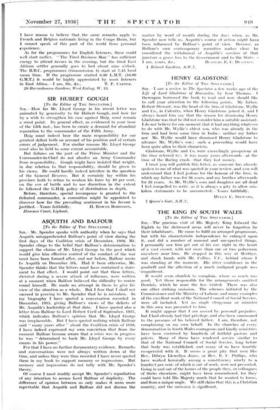ASQUITH AND BALFOUR
[To the Editor of THE SPECTATOR.]
Sue,—Mr. Spender speaks with authority when he says that Asquith misapprehended Balfour's point of view during the first days of the Coalition crisis of December, 1916. Mr. Spender clings to the belief that Balfour's determination to support the claims of Mr. Lloyd George to the post which would give him effective control of the conduct of the war must have been fonned after, and not befoie, Balfour wrote to Asquith on December 5th. Had it been otherwise, Mr. Spender thinks that the letters must have contained a state- ment to that effect. I would point out that these letters, dictated during a severe attack of influenza, were written at a moment when Balfour believed the difficulty to centre round himself. He made no attempt in them to give his view of the situation as a whole. But I fear that I shall not succeed in proving to Mr. Spender that he is mistaken. In my biography I have quoted a conversation recorded in December, 1915, giving Balfour's views of the defects of Mr. Asquith's leadership at that date. I have quoted also a letter from Balfour to Lord Robert Cecil of September, 1917, which indicates Balfour's opinion that Mr. Lloyd George was irreplaceable. But I have quoted nothing which Balfour said " many years after " about the Coalition crisis of 1916. I have indeed expressed my own conviction that from the moment Balfour became aware that a crisis was in progress he was " determined to back Mr. Lloyd George by every means in his power."
For that I have no further documentary evidence. Remarks and conversations were not always written down at the time, and unless they were thus recorded I have never quoted them in my book to support memory or impressions. But memory and impressions do not tally with Mr. Spender's theory.
Of course I most readily accept Mr. Spender's repudiation of any intention to accuse Lord Balfour of duplicity. The difference of opinion between us only makes it seem more regrettable that Asquith and Balfour did not discuss the matter by word of mouth during the days when, as Mr. Spender now tells us, Asquith's course of action might have been influenced by Balfour's point of view. Because, as Balfour's own contemporary narrative makes clear, he considered the withdrawal of Asquith's services at that juncture a grave loss to the Government and to the State.• —














































 Previous page
Previous page